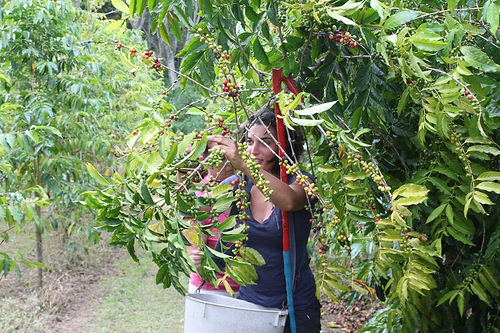The Foreign Agricultural Service (FAS) office in Ottawa, through its food and beverage alliance, tasteUS!, recently launched a new website that provides Canadians with information on top quality U.S.-grown food and the more than 40 U.S. cooperators whose products are found in grocery stores across Canada.
“Our tasteUS! website is a great tool for Canadians in helping them understand the agricultural goods imported from the U.S. that are available to them. We’re promoting a ‘buy regionally’ approach that can bring down grocery costs – especially in the winter months when Canadian produce is scarcer,” said Scott Reynolds, FAS Minister-Counselor for Agricultural Affairs at the U.S. Embassy in Ottawa.
Found at www.tasteUS.ca, the website has detailed information on tasteUS! affiliated cooperators, relevant news articles, facts on nutrition and recipes provided by the cooperators. It allows Canadians to educate themselves about the food and beverages imported into Canada from the United States – from fresh fruit like apples, pears and peaches, to vegetables such as tomatoes, to wine, beer and fruit juices – and the producers behind it all. Some of the cooperators represent commodities not grown in Canada, such as papaya and catfish. Access to these types of foods gives Canadians even more options to support their healthy food choices. Read more »

EU Commissioner of Agriculture and Rural Development Dacian Cioloş (left) Agriculture Deputy Secretary Kathleen Merrigan announced that the United States and the European Union formed a partnership that will recognize the two organic programs as equivalent and allow access to each other's markets. The announcement was made at the BioFach World Organic Fair in Nuremberg, Germany on Wednesday, Feb. 15, 2012. Photo courtesy of the European Commission.
Travis Forgues is an organic dairy farmer in the town of Alburgh in northwest Vermont, almost at the Canadian border and surrounded on three sides by Lake Champlain. Like many of the other dairy farmers in northern Vermont, Travis is a realist. He went to college. He tried city life. But he was born into farming, and that’s how he wanted to raise his own family. So Travis went to his dad and had a talk about organic farming, and he convinced his father, and then many others, to convert their land from conventional agricultural practices to organic. As Travis saw it, organics was a growing niche within American agriculture, and consumer demand for organically produced dairy was taking off. Better still, consumers were willing to pay more for organic products. Today, as a result of Travis’ work, nearly 130 dairy farmers across New England have signed on to the “New England Pastures” organic dairy cooperative for Organic Valley. Read more »

The company prides itself on handpicking all of its coffee cherries. (Photo credit: Hawaii Exports International)
Hawaii Exports International (HEI) of Honolulu has successfully introduced its award-winning Kona and Ka’u coffees to the Canadian market with the support of USDA’s Foreign Agricultural Service (FAS) office in Canada, the FAS-funded Western U.S. Agricultural Trade Association (WUSATA), and the Hawaii Department of Agriculture (HDOA). Read more »
This post is part of the Science Tuesday feature series on the USDA blog. Check back each week as we showcase stories and news from the USDA’s rich science and research portfolio.
Have you ever wondered how American agriculture compares with farming in our neighboring countries to the north and south? In today’s global economy, many people seek information about farmers, farmland and the production of food and other agricultural products around the world. A tripartite committee of agricultural statistical agencies in Mexico, Canada and the United States has launched a new website to make the comparison among the three North American nations easier. Read more »
Last week, I traveled to Canada – the second-largest market for U.S. agricultural products. Wanting to see our companies promoting U.S. export sales, I attended SIAL Canada, an international trade show in Toronto, which welcomed more than 530 exhibitors and 12,000 food and agricultural business professionals from around the world.
While there, I met with the 28 American companies exhibiting in the USA pavilion, which was endorsed by USDA. Many of the companies were only able to attend the show because of support from the State Trade Regional Groups (STRGs) and the Foreign Agricultural Service (FAS) market development programs. Read more »

Maryanne Wedner, of Grgich Hills Estates, was one of many representatives showcasing their vintages at the California Wine Fair in Ottawa.
The United States and Canada have maintained a strong trade relationship over the years, sharing signature products from both countries. In 2010, U.S. agricultural exports to Canada were valued at $16.8 billion. Geographical proximity, similar business practices and eating habits make Canada an attractive export market for new-to-export and new-to-market U.S. companies. Canadians often travel to the United States, developing a taste for our regional flavors, including California wine. Read more »



